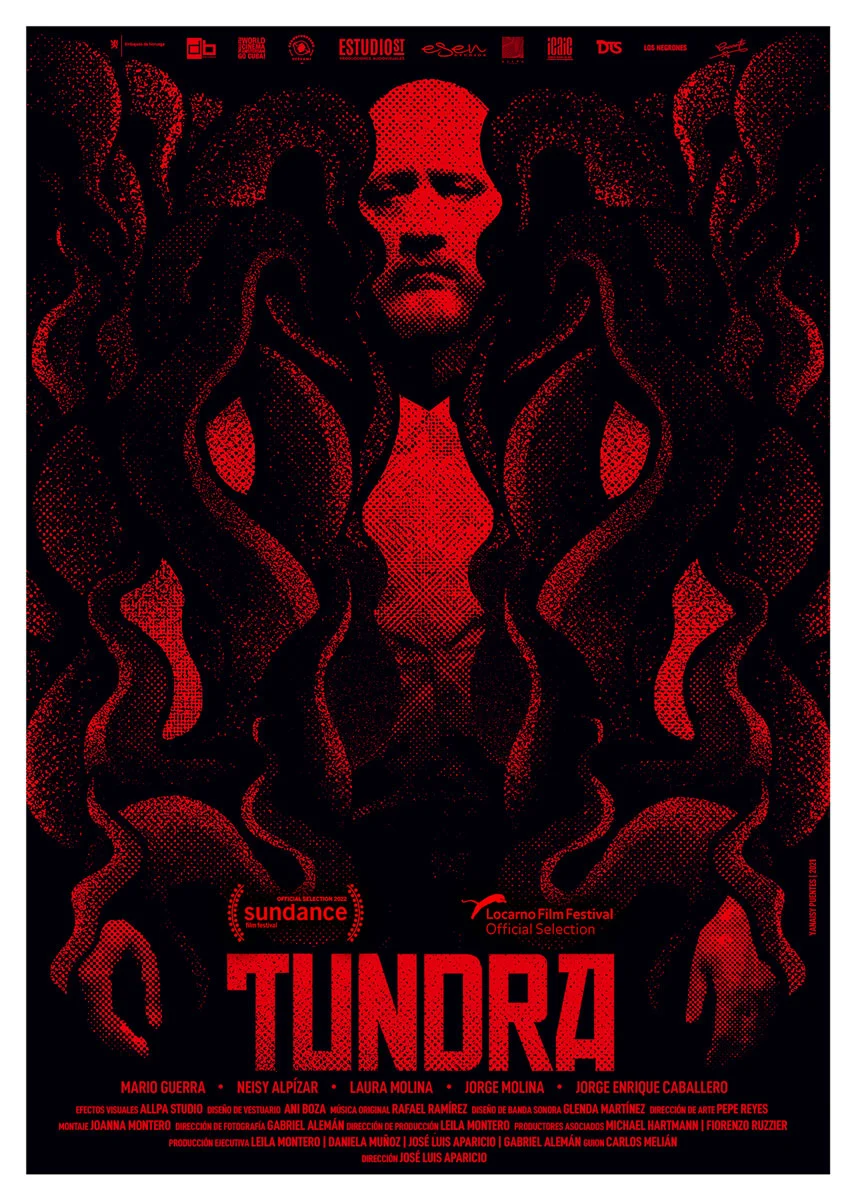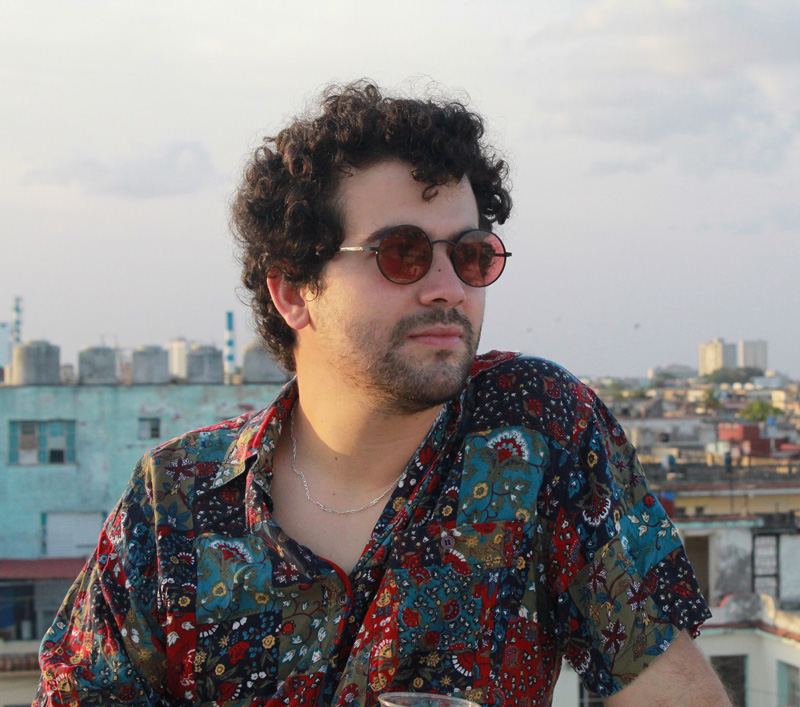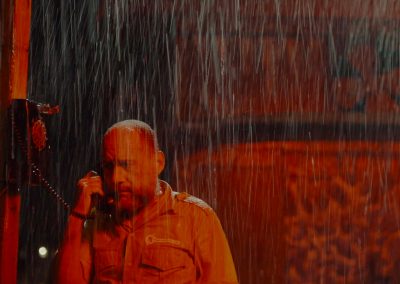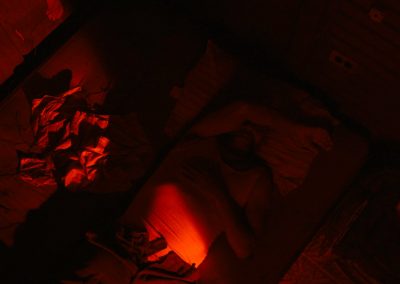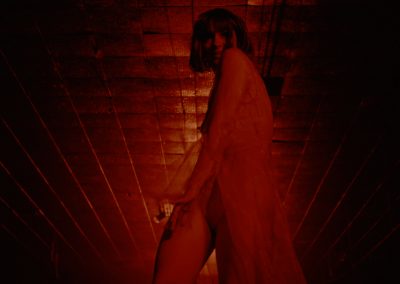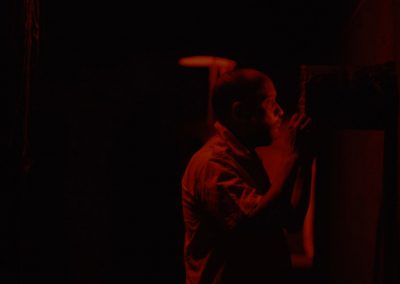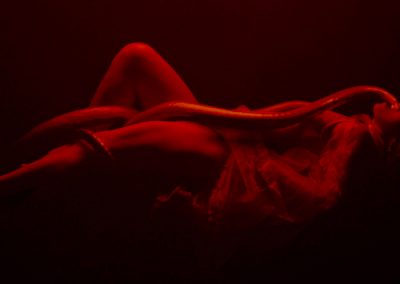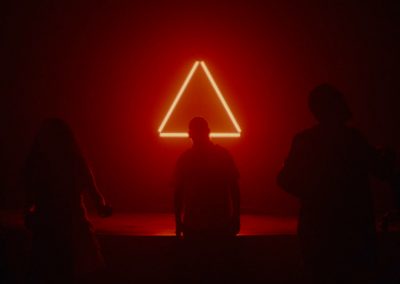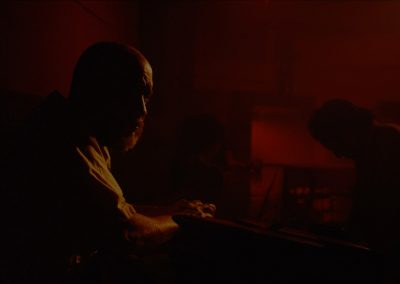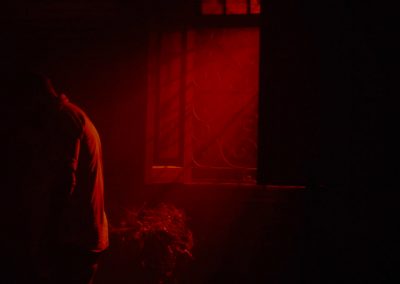Walfrido Larduet, a lonely electrical inspector, dreams of the Red Woman, whose image persists and becomes an obsession. Something tells him she is near. Over the course of a day, Walfrido will follow her trail as he travels through the suburbs of an infested city.
Walfrido Larduet, a lonely electrical inspector, dreams of the Red Woman, whose image persists and becomes an obsession. Something tells him she is near. Over the course of a day, Walfrido will follow her trail as he travels through the suburbs of an infested city.
TUNDRA
Cuba, 2021 / 30′
a film by
José Luis Aparicio
with
Mario Guerra
Neisy Alpízar
Laura Molina
Jorge Molina
Jorge Enrique Caballero
| Screenplay | Carlos Melián |
| Director of Photography | Gabriel Alemán |
| Production Design | Pepe Reyes |
| Costume Design | Any Boza |
| Editor | Joanna Montero |
| Composer | Rafael Ramírez |
| Sound | Glenda Martínez |
| Producer | Leila Montero Daniela Muñoz José Luis Aparicio Gabriel Alemán |
| Production | Leila Montero |
| Distribution | Esen Studios |



BEST SHORT FILM
– Fantaspoa (Brazil) | 2022
– New York City Indie Film Festival (USA) | 2022
– Seattle Latino Film Festival (USA) | 2022
Jury motivation:
“The members of the jury grant the award for Best short film of the Narrative competition to TUNDRA from Cuba (directed by José Luis Aparicio). For the ways it connects the regular days of the main character with a surreal approach that even takes a grotesque-imaginative turn. This is a successful and complete experimentation of fantastic realism in its definition of an entire aesthetic and poetic world.”

BEST DIRECTOR

BEST CINEMATOGRAPHY / BEST PRODUCTION DESIGN
SHORT to the Point (Romania) | 2022

BEST GENRE
Jeonju International Film Festival (South Korea) | 2022

HONORABLE MENTION

BEST SHORT FILM
– Fantaspoa (Brazil) | 2022
– New York City Indie Film Festival (USA) | 2022
– Seattle Latino Film Festival (USA) | 2022
Jury motivation:
“The members of the jury grant the award for Best short film of the Narrative competition to TUNDRA from Cuba (directed by José Luis Aparicio). For the ways it connects the regular days of the main character with a surreal approach that even takes a grotesque-imaginative turn. This is a successful and complete experimentation of fantastic realism in its definition of an entire aesthetic and poetic world.”

BEST DIRECTOR
Seattle Latino Film Festival (USA) | 2022

BEST CINEMATOGRAPHY / BEST PRODUCTION DESIGN

BEST GENRE
Jeonju International Film Festival (South Korea) | 2022

HONORABLE MENTION

OFFICIAL SELECTIONS
- Sundance Film Festival (USA) | Oscar Qualifying Festival
- Locarno Film Festival (Switzerland) | Oscar Qualifying Festival
- Raindance Film Festival (UK) | Oscar Qualifying Festival
- Curta Cinema – Rio de Janeiro International Short Film Festival (Brazil) | Oscar Qualifying Festival
- GIFF – Guanajuato International Film Festival (Mexico) | Oscar Qualifying Festival
- Imagine Fantastic Film Festival (Holland) | Méliès d’Or Qualifying Festival
- BAFICI – Buenos Aires Festival Internacional de Cine Independiente (Argentina)
- Miami Film Festival (USA)
- Fantaspoa (Brazil) | Méliès d’Or Qualifying Festival
- Yubari International Fantastic Film Festival (Japan)
- Seattle Latino Film Festival (USA)
- Houston Latino Film Festival (USA)
- Festival Internacional de Cinema de Brasilia (Brazil)
- Uruguay International Film Festival (Uruguay)
- Pendance Film Festival (Canada)
- Shorts Mexico – Festival Internacional de Cortometrajes de México (Mexico)
- Lublin Film Festival (Poland)
- UFF – Uşak Kısa Film Festivali (Turkey)
- KineNova Film Festivali (Macedonia)
- Torino Underground Cinefest (Italy)
- New Jersey International Film Festival (USA)
- Philadelphia Independent Film Festival (USA)
- New York City Independent Film Festival (USA)
- Santa Fe Film Festival (USA)
- NewFilmMakers L.A. (USA)
- Philadelphia Latino Film Festival (USA)
- San Diego Latino Film Festival (USA)
- New York Latino Film Festival (USA)
- H.P. Lovecraft Film Festival and CthulhuCon (USA)
- ViVe Latino Film Fest (Canada)
- Jeonju International Short Film Festival (South Korea)
- Cheongju International Short Film Festival (South Korea)
- Lago Film Fest (Italy)
- Galacticat – Fantastic and Terror Film Festival in Tàrrega (Spain)
- SHORT to the Point (Romania)
- The Paus Premieres Film Festival (UK)
- Insolito Festival de Cine Fantastico (Peru)
- The Quarantine Film Festival (Bulgaria)

OFFICIAL SELECTIONS
- Sundance Film Festival (USA) | Oscar Qualifying Festival
- Locarno Film Festival (Switzerland) | Oscar Qualifying Festival
- Raindance Film Festival (UK) | Oscar Qualifying Festival
- Curta Cinema – Rio de Janeiro International Short Film Festival (Brazil) | Oscar Qualifying Festival
- GIFF – Guanajuato International Film Festival (Mexico) | Oscar Qualifying Festival
- Imagine Fantastic Film Festival (Holland) | Méliès d’Or Qualifying Festival
- BAFICI – Buenos Aires Festival Internacional de Cine Independiente (Argentina)
- Miami Film Festival (USA)
- Fantaspoa (Brazil) | Méliès d’Or Qualifying Festival
- Yubari International Fantastic Film Festival (Japan)
- Seattle Latino Film Festival (USA)
- Houston Latino Film Festival (USA)
- Festival Internacional de Cinema de Brasilia (Brazil)
- Uruguay International Film Festival (Uruguay)
- Pendance Film Festival (Canada)
- Shorts Mexico – Festival Internacional de Cortometrajes de México (Mexico)
- Lublin Film Festival (Poland)
- UFF – Uşak Kısa Film Festivali (Turkey)
- KineNova Film Festivali (Macedonia)
- Torino Underground Cinefest (Italy)
- New Jersey International Film Festival (USA)
- Philadelphia Independent Film Festival (USA)
- New York City Independent Film Festival (USA)
- Santa Fe Film Festival (USA)
- NewFilmMakers L.A. (USA)
- Philadelphia Latino Film Festival (USA)
- San Diego Latino Film Festival (USA)
- New York Latino Film Festival (USA)
- H.P. Lovecraft Film Festival and CthulhuCon (USA)
- ViVe Latino Film Fest (Canada)
- Jeonju International Short Film Festival (South Korea)
- Cheongju International Short Film Festival (South Korea)
- Lago Film Fest (Italy)
- Galacticat – Fantastic and Terror Film Festival in Tàrrega (Spain)
- SHORT to the Point (Romania)
- The Paus Premieres Film Festival (UK)
- Insolito Festival de Cine Fantastico (Peru)
- The Quarantine Film Festival (Bulgaria)
José Luis Aparicio
José Luis Aparicio Ferrera (Cuba, 1994), independent filmmaker, critic and curator. B.A. in Film and Television Directing from Cuba’s University of the Arts (ISA). His graduation short-film El Secadero / Dryland (2019) won several awards in Cuba, Panama and Mexico and was also selected for several film festivals in Latin America and the U.S. His medium-length documentary Sueños al pairo / Dreams adrift (2020) was censored by the Cuban government due to its criticism of the regime’s violent history. It had its world premiere in Argentine’s BAFICI and has been selected for several European festivals. His latest fiction short-film Tundra (2021) had its world premiere in Curta Cinema – Río de Janeiro International Short Film Festival and its North American premiere in the 2022 Sundance Film Festival. In 2019 he was named amongst the “One hundred latinos that create and inspire a better future” by Colombia’s Avianca magazine. As a film critic he created the Cine Cubano en Cuarentena / Cuban Cinema in Quarantine (CCC) initiative, a collaborative effort aimed at the preservation, research and exhibition of Cuban cinematic legacy.
He has written about cinema and arts for several Cuban magazines and he also participated with three articles in the encyclopedia A Cuban Cinema Companion (2019, Rowman & Littlefield Publishers). He worked as a programmer of the 2nd Mexico City Independent Film Festival and currently performs as head curator of Cuba’s INSTAR Film Festival. He’s currently developing two feature films: the creative documentary El mar / The sea and the fiction project Ismael.
José Luis Aparicio
José Luis Aparicio Ferrera (Cuba, 1994), independent filmmaker, critic and curator. B.A. in Film and Television Directing from Cuba’s University of the Arts (ISA). His graduation short-film El Secadero / Dryland (2019) won several awards in Cuba, Panama and Mexico and was also selected for several film festivals in Latin America and the U.S. His medium-length documentary Sueños al pairo / Dreams adrift (2020) was censored by the Cuban government due to its criticism of the regime’s violent history. It had its world premiere in Argentine’s BAFICI and has been selected for several European festivals. His latest fiction short-film Tundra (2021) had its world premiere in Curta Cinema – Río de Janeiro International Short Film Festival and its North American premiere in the 2022 Sundance Film Festival. In 2019 he was named amongst the “One hundred latinos that create and inspire a better future” by Colombia’s Avianca magazine. As a film critic he created the Cine Cubano en Cuarentena / Cuban Cinema in Quarantine (CCC) initiative, a collaborative effort aimed at the preservation, research and exhibition of Cuban cinematic legacy.
He has written about cinema and arts for several Cuban magazines and he also participated with three articles in the encyclopedia A Cuban Cinema Companion (2019, Rowman & Littlefield Publishers). He worked as a programmer of the 2nd Mexico City Independent Film Festival and currently performs as head curator of Cuba’s INSTAR Film Festival. He’s currently developing two feature films: the creative documentary El mar / The sea and the fiction project Ismael.
Director statement
Russian poet Osip Mandelshtam once wrote: “Humans howl like wild beasts, / and wild beasts look like humans”. Individuals, like beasts, are made of fears and desires. Tundra is a film about these drives. About the frustration that leads to paralysis. I see Cuba as an immobile landscape: the desolate wasteland where nothing grows, where nothing ever happens. The country has taken on the physical aspect of our inner chaos, it stands as a vestigial zone, a post-disaster region. Here the catastrophe occurred silently at some point in the past. What came after is not a part of history.
This film delves into the ghostly aspect of the life in Cuba, usually driven by inertia and automatism. An existence full of physical and mental obstacles, where frustrated desires become entrenched and don’t allow us to move forward. Our main character lives with a monster that grows more and more, emulating the increase of his frustration. He doesn’t know how to get rid of the creature and has ended up accepting it. That is the Cubans’ reflex-response to their problems: resignation. Every individual in the city also has his monster, a metaphor for the cancer that sickens the whole island.
That existential weariness has also become the weariness of the forms. Cuban art, in general, is timid when it comes to deploying its aesthetic devices. It lacks risk and abounds in stereotypes to codify our (ir)reality. One of the main limitations is the insistence on realism as a straitjacket. I believe that realism doesn’t provide us with enough tools to reveal ourselves, that is why I rely on fantasy, science-fiction and the mixture of genres.
It’s necessary that Cuban cinema begins to capture the dark side of our reality. Becoming aware of our problems, our sufferings, is the first step in the construction of a better society, with active individuals in the mission of transforming it. It is necessary to annihilate the beast, but first assume that it is part of ourselves, that sometimes it is impossible to separate us. Exposing the pathos and absurdity of our circumstances is the first symptom of maturity. A preamble to the act of moving forward.
Director statement
Russian poet Osip Mandelshtam once wrote: “Humans howl like wild beasts, / and wild beasts look like humans”. Individuals, like beasts, are made of fears and desires. Tundra is a film about these drives. About the frustration that leads to paralysis. I see Cuba as an immobile landscape: the desolate wasteland where nothing grows, where nothing ever happens. The country has taken on the physical aspect of our inner chaos, it stands as a vestigial zone, a post-disaster region. Here the catastrophe occurred silently at some point in the past. What came after is not a part of history.
This film delves into the ghostly aspect of the life in Cuba, usually driven by inertia and automatism. An existence full of physical and mental obstacles, where frustrated desires become entrenched and don’t allow us to move forward. Our main character lives with a monster that grows more and more, emulating the increase of his frustration. He doesn’t know how to get rid of the creature and has ended up accepting it. That is the Cubans’ reflex-response to their problems: resignation. Every individual in the city also has his monster, a metaphor for the cancer that sickens the whole island.
That existential weariness has also become the weariness of the forms. Cuban art, in general, is timid when it comes to deploying its aesthetic devices. It lacks risk and abounds in stereotypes to codify our (ir)reality. One of the main limitations is the insistence on realism as a straitjacket. I believe that realism doesn’t provide us with enough tools to reveal ourselves, that is why I rely on fantasy, science-fiction and the mixture of genres.
It’s necessary that Cuban cinema begins to capture the dark side of our reality. Becoming aware of our problems, our sufferings, is the first step in the construction of a better society, with active individuals in the mission of transforming it. It is necessary to annihilate the beast, but first assume that it is part of ourselves, that sometimes it is impossible to separate us. Exposing the pathos and absurdity of our circumstances is the first symptom of maturity. A preamble to the act of moving forward.

